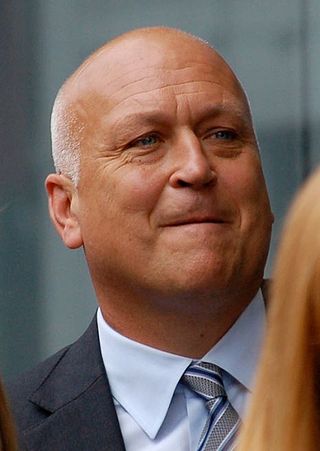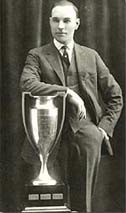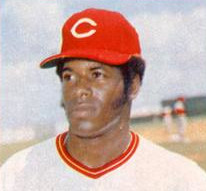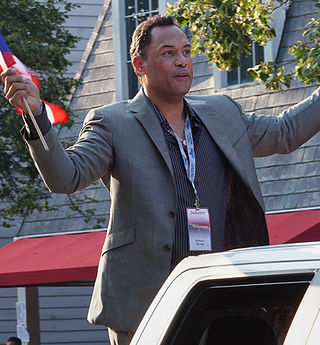
George Kenneth Griffey Jr., nicknamed "Junior" and "the Kid", is an American former professional baseball outfielder who played 22 years in Major League Baseball (MLB). He spent most of his career with the Seattle Mariners and Cincinnati Reds, along with a short stint with the Chicago White Sox. The first overall pick in the 1987 draft and a 13-time All-Star, Griffey is one of the most prolific home run hitters in baseball history; his 630 home runs rank as the seventh-most in MLB history. Griffey was also an exceptional defender and won 10 Gold Glove Awards in center field. He is tied for the record of most consecutive games with a home run.

Calvin Edwin Ripken Jr., nicknamed "the Iron Man", is an American former baseball shortstop and third baseman who played his entire 21-season career in Major League Baseball (MLB) for the Baltimore Orioles (1981–2001). One of his position's most productive offensive players, Ripken compiled 3,184 hits, 431 home runs, and 1,695 runs batted in during his career, and he won two Gold Glove Awards for his defense. He was a 19-time All-Star and was twice named American League (AL) Most Valuable Player (MVP), in 1983 and 1991. Ripken holds the record for consecutive games played (2,632), having surpassed Lou Gehrig's streak of 2,130 which had stood for 56 years and which many deemed was unbreakable. In 2007, he was elected to the Baseball Hall of Fame in his first year of eligibility with 98.53% of votes, the sixth-highest election percentage ever to-date.

In team sports, a most valuable player (MVP) award is an honor typically bestowed upon an individual whose individual performance is the greatest in an entire league, for a particular competition, or on a specific team. The purpose of the award is to recognize the contribution of the individual's efforts amongst a group effort, and to highlight the excellence, exemplariness, and/or outstandingness of a player's performance amidst the performance of their peers in question.

George Kenneth Griffey Sr. is an American former professional baseball outfielder. He played in Major League Baseball (MLB) from 1973 through 1991, most notably as a member of the Cincinnati Reds dynasty that won three division titles and two World Series championships between 1973 and 1976. He also played for the New York Yankees, Atlanta Braves, and Seattle Mariners.

Roberto Alomar Velázquez is a Puerto Rican former second baseman who played in Major League Baseball (MLB) for sixteen seasons. He is regarded as one of the greatest second basemen and all-around players in baseball history. During his career, the 12-time All-Star won more Gold Glove Awards (10) than any other second baseman in baseball history, in addition to winning four Silver Slugger Awards for his hitting. Among second basemen, he ranks third in games played (2,320), fifth in stolen bases (474), sixth in plate appearances (10,400), seventh in doubles (504) and assists (6,524), and eighth in hits (2,724), runs (1,508), at-bats (9,073), and double plays turned (1,407). In 2011, Alomar was inducted into the National Baseball Hall of Fame.

The Big Red Machine is a nickname for the Cincinnati Reds baseball team that dominated the National League from 1970 to 1979 and is widely recognized as being among the best in baseball history.

Santos Alomar Velázquez, known as Sandy Alomar Jr., is a Puerto Rican former professional baseball player, coach, and manager. He played in Major League Baseball as a catcher between 1988 and 2007, most notably as a member of the Cleveland Indians where he was a six-time All-Star player and won two American League pennants. Alomar was inducted into the Cleveland Indians Hall of Fame in 2009.
Professional baseball leagues, amateur-baseball organizations, sportswriting associations, and other groups confer awards on various baseball teams, players, managers, coaches, executives, broadcasters, writers, and other baseball-related people for excellence in achievement, sportsmanship, and community involvement.
The Major League Baseball Comeback Player of the Year Award is presented by Major League Baseball (MLB) to the player who is judged to have "re-emerged on the baseball field during a given season." The award was developed in 2005, as part of a sponsorship agreement between MLB and Viagra. In 2005 and 2006 representatives from MLB and MLB.com selected six candidates each from the American (AL) and National Leagues (NL) and one winner for each league was selected via an online poll on MLB.com. Since then, the winners have been selected by a panel of MLB beat reporters. Under the current voting structure, first place votes are worth five points, second place votes worth three, and third place votes worth one with the award going to the player with the most points overall. Past winners have often overcome injury or personal problems en route to their award-winning season.

The Willie Mays World Series Most Valuable Player (MVP) Award is given to the Major League Baseball (MLB) player deemed to have the most impact on his team's performance in the World Series, which is the final round of the MLB postseason. The award was first presented in 1955 by Sport magazine, but since 1985 has been officially presented by MLB. The winner is determined during the final game of the World Series by a committee of reporters and officials present at the game.
The Topps All-Star Rookie Team, also known as the Topps ASRT, is a list of notable Major League Baseball rookie players chosen annually by Topps Company, Inc. In most years since 1960, the company has issued a special set of baseball cards featuring the team's members.

The 2001 Major League Baseball All-Star Game was the 72nd playing of the midsummer classic between the all-stars of the American League (AL) and National League (NL), the two leagues comprising Major League Baseball. The game was held on July 10, 2001 at Safeco Field in Seattle, Washington, home of the Seattle Mariners of the American League. The American League defeated the National League, 4–1. This was Cal Ripken Jr.'s 19th and final All-Star Game. It was also the final All-Star Game for San Diego Padres right fielder Tony Gwynn.
The 1995 Major League Baseball season was the first season to be played under the expanded postseason format, as the League Division Series (LDS) was played in both the American and National leagues for the first time, since the 1981 strike-split season. However, due to the 1994–95 Major League Baseball strike which carried into the 1995 season, a shortened 144-game schedule commenced on April 25, when the Florida Marlins played host to the Los Angeles Dodgers.

The 1994 Major League Baseball All-Star Game was the 65th playing of the midsummer classic between the all-stars of the American League (AL) and National League (NL), the two leagues comprising Major League Baseball. The game was held on July 12, 1994, at Three Rivers Stadium in Pittsburgh, Pennsylvania, the home of the Pittsburgh Pirates of the National League, and tied the Pirates with the Cleveland Guardians and Cincinnati Reds for the all-time record of most All-Star Games hosted by one franchise, with four. It was the second and final Midsummer Classic to be held at Three Rivers Stadium, as the Pirates would move to PNC Park ahead of hosting the 2006 MLB All-Star Game.

The 1991 Baltimore Orioles season was a season in American baseball. It involved the Orioles finishing sixth in the American League East with a record of 67 wins and 95 losses. Cal Ripken. Jr. would be the first shortstop in the history of the American League to win two MVP awards in a career. This was also the Orioles' last year at Memorial Stadium, as they would move into Oriole Park at Camden Yards the following year.

The 1983 Baltimore Orioles won the Major League Baseball World Series after finishing first in the American League East with a record of 98 wins and 64 losses, The Orioles won the championship by beating the Philadelphia Philles, 4–1, in the 1983 World Series. The season was the Orioles' first in nearly 15 years without manager Earl Weaver, who retired after the Orioles missed the playoffs in the final game of the 1982 season. The Orioles replaced the future Hall of Famer Weaver with Joe Altobelli. The World Series victory was the Orioles' first championship since 1970 and their most recent to date.

The 1987 Major League Baseball draft is the process by which Major League Baseball (MLB) teams select athletes to play for their organization. High school seniors, college juniors and seniors, and anyone who had never played under a professional contract were considered eligible for the draft. The 1987 MLB Draft took place as a conference call to the Commissioner of Baseball's office in New York from June 2–4. As opposed to the National Football League Draft which appeared on ESPN, no network aired the MLB Draft.
The Commissioner's Historic Achievement Award is awarded by the commissioner of baseball, the chief executive of Major League Baseball (MLB), to a group or person who has made a "major impact on the sport" of baseball. It is not an annual award; rather, the Commissioner presents it at his discretion. The trophy is a gold baseball sitting atop a cylindrical silver base, created by Tiffany & Co. The award has been presented sixteen times: thirteen times to players, once to a team, and twice to a non-player. Mark McGwire and Sammy Sosa were the first to receive the award for their parts in the 1998 MLB home run record chase. The most recent recipient is Shohei Ohtani, who was honored in 2021 for being the first player in MLB history to be an All-Star as both a starting pitcher and a lead-off hitter in the 2021 All-Star Game and for completing a two-way season as a hitter and as a pitcher. The 2001 Seattle Mariners won the award as a team for posting a 116–46 record. Roberto Clemente, the 2006 awardee, is the only player to receive the award posthumously; his award was accepted by his wife, Vera.
















